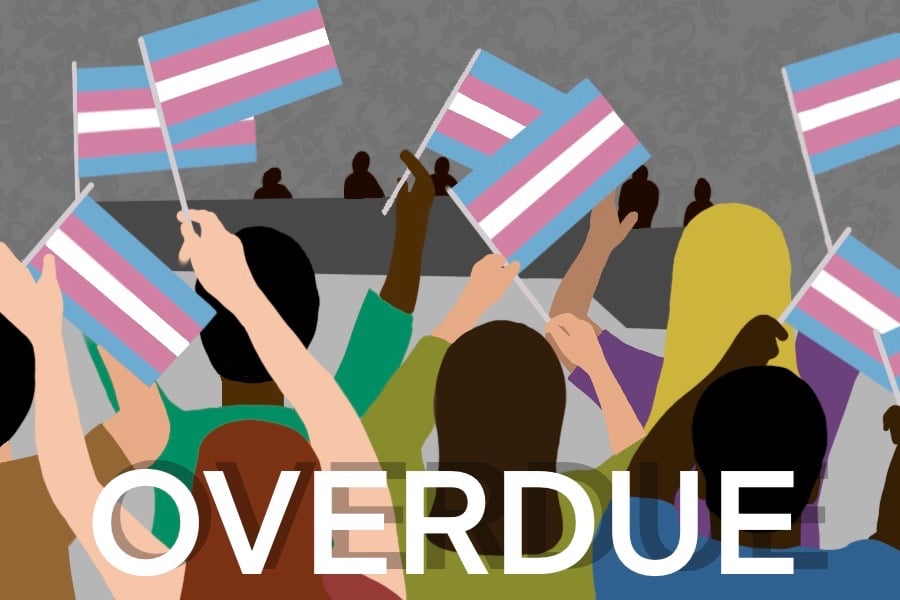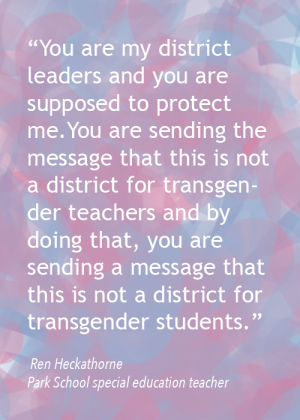In Focus: A Park School teacher faced harassment after coming out as transgender. The school district struggled to act.
June 16, 2020
From a young age, Ren Heckathorne always saw themself as a teacher.
Education always fascinated Heckathorne. They became familiar with the classroom and teaching from watching their mother, a special education teacher.
“I had the experience of going into her classroom as a kid and hearing stories,” Heckathorne said. “I remember being in awe of everything that was going on.”
Heckathorne attended Evanston/Skokie School District 65 schools throughout their childhood and volunteered at Park School’s summer camp from sixth grade until high school graduation. Now, Heckathorne is a special education teacher at Park School — an experience they called “surreal.”
But Heckathorne’s return to the district wasn’t everything they’d hoped for. With it came years of repeated discrimination on the basis of their gender identity.
On June 15, the Supreme Court ruled in a long-awaited decision that discrimination against employees based on sexual orientation or transgender status is illegal according to Title VII of the Civil Rights Act. Prior to the decision, individual schools, districts and states had varying protections for staff, but countless educators weren’t federally guaranteed those rights.
While the decision is a major victory for LGBTQ+ employees, Heckathorne still painfully discovered first hand the lack of protections for LGBTQ+ staff members after opening up about their gender identity in 2016. What followed was an uphill struggle that would shove Heckathorne into the spotlight.
“Uncharted waters”
Heckathorne said they weren’t “at all in the closet” about their sexuality when they were hired as a staff member at Park School in 2014. Diversity in sexuality was represented at Park School, Heckathorne said, and they felt it would be a safe space.
When they decided to come out about their gender identity, however, it was a different story.
Heckathorne wasn’t comfortable enough to openly identify as transgender during their first few years teaching at Park School. They suppressed parts of themself because they were worried their colleagues wouldn’t be accepting — just because it was safe to be out in one part of their identity didn’t necessarily mean it was safe to be out in another.
These experiences, however, began to heavily affect their relationships with colleagues and their ability to teach. Heckathorne said the driving force for taking action — which they decided to do in October 2016 — was the need for colleagues to use the correct pronouns. Because they didn’t see a significant presence of openly trans employees in the district, they felt they had to do something.
“So much of someone’s gender identity is based in language,” Heckathorne said. “I felt very alone, but also really sure that I needed to do it.”
After bringing the issue up to the principal, who no longer works at Park School, Heckathorne had planned to come out at a staff meeting. While the plan was set, much of the response they received prior to the meeting was uncertainty. While the principal was supportive of their decision, they were frequently told that the district, having never encountered this situation, was in “uncharted waters.”
The district’s clear absence of any plan of action or any concrete protections was daunting, Heckathorne said.
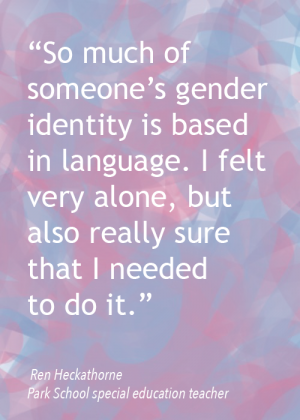
In many work environments, including in education, a lack of enumerated protections creates one of the most glaring barriers for LGBTQ+ employees.
“A lot of the attention, obviously, has been put more towards the students,” said Avi Rudnick, the director of scattered-site housing at Chicago House and Social Service Agency. “Not as much to the conditions for queer teachers, or specifically, teachers that don’t fit into the binary.”
Chicago House is an organization serving the broader LGBTQ+ community with housing, employment and legal resources. Rudnick said in his experience working with the agency, as well as in his separate work with the Transformative Justice Law Project of Illinois, he’s seen many instances of transgender and gender-expansive employees struggling to find support from their employers.
Heckathorne’s situation was no exception. Without sufficient backup support from the district, they decided to still come out at a staff meeting and through a letter in colleagues’ mailboxes. They said it was important for all their colleagues to be aware of their coming out at the same time.
“There was such a clear urgency in me,” Heckathorne said. “Either I can’t keep working in a space I’m not out, or I need to take the risk and come out. Once I sort of sat with that, there wasn’t any going back.”
Pushed over the edge
After Heckathorne’s communication with their colleagues, the reactions were swift. Heckathorne said the following day, after they had left letters in the mailboxes, a paraprofessional in their classroom told Heckathorne she had read the letter and expressed concern at the idea of working with them.
During that same 2016-2017 school year, Heckathorne said the same paraprofessional continued harassing them, repeatedly telling them they were “going to hell,” and suggesting that it was dangerous for them to be in the presence of children. The comments, Heckathorne said, seemed to be rooted in a conflict between her religious beliefs and their gender identity.
The paraprofessional’s comments were just the beginning of three years of targeted harassment, which continued in multiple forms from the day after Heckathorne came out to their colleagues. Heckathorne said the most hurtful forms of harassment they received were specific implications that children shouldn’t be “subjected” to someone like them.
“Those (comments) were the ones that hurt a thousand times more,” Heckathorne said. “To question my ability to do what I love to do and to paint me as some sort of monster…was so, so painful, and I felt totally helpless in it.”
In the weeks and months after Heckathorne came out, other staff members insisted on using incorrect pronouns when speaking to or referring to them. Heckathorne said at the time, few co-workers offered any validation or assurance that they weren’t in the wrong for asking colleagues to change their language.
Despite the continuous, discriminatory and discouraging messages Heckathorne was receiving, they decided to take another step before the 2019-2020 school year: asking their colleagues to change the name they were using for them.

“I had been using Ren outside of work for a while,” Heckathorne said. “It sort of got to the point of, ‘Well, it couldn’t go much worse than it did when I told people my pronouns, so what am I waiting for?’”
The discrimination around their name change began when Heckathorne asked an office staff member for their name to be changed on their mailbox before the beginning of the upcoming school year. The staff member refused.
Heckathorne was eventually able to get their correct name displayed on their mailbox only after bringing the issue to the attention of more senior staff members, but Heckathorne noticed a change in the first staff member’s attitude towards them. They said the staff member would refer to them as a “pronoun person,” saying she couldn’t keep up with all the “phases” of Heckathorne’s identity. The staff member would even use Heckathorne’s incorrect name or pronouns over the school intercom.
“I was so fearful of her that I wouldn’t want to go to the office to get the supplies I needed,” Heckathorne said. “It was impacting my ability to be what I needed to be for my students.”
Heckathorne said other colleagues began to raise concerns about the harassment after witnessing what was happening, but there was still no action at the district or administrative levels. Because of the continued harassment, Heckathorne chose to take a leave of absence for about a month shortly after the start of the 2019-2020 school year, deciding they could no longer tolerate the incessant mistreatment.
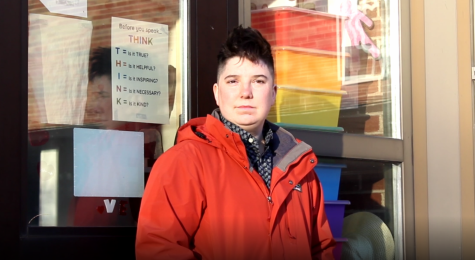
“I am a different person now than I was when I initially came out,” Heckathorne said. “I just couldn’t go down the road again that I did before.”
Emails obtained by The Daily between D65 administrators show that the D65 interim superintendents, Phil Ehrhardt and Heidi Wennstrom, were aware of the harassment that had occurred, and that the harassment was the reason for Heckathorne’s leave of absence in the fall. Despite this knowledge, no communication was given to families of students in Heckathorne’s class about the reason for their absence.
In the emails, Wennstrom defers Heckathorne to Beatrice Davis, the assistant superintendent of human resources, noting that she and Ehrhardt would be in contact with Davis about the “resolution on this matter.”
The leave of absence was a turning point for Heckathorne — an indication that they couldn’t go on teaching given the discrimination they were experiencing. In September of the 2019-2020 school year, they knew they had to say something publicly.
Sending a message
On Sept. 23, Heckathorne stood at a podium in front of the D65 Board of Education and described their frustration at the discrimination they were experiencing. Voices accompanied them, including those of their mother, their colleagues and parents in the D65 community.
By the time of the board meeting, Heckathorne had filed two formal grievances with the district, both of which went generally unaddressed in terms of any concrete action. The first, filed in February 2017, referred to the paraprofessional who had been harassing Heckathorne. The complaint prompted an investigation into workplace harassment, but Heckathorne said even the human resources staff was not using their correct pronouns. The district eventually deemed the grievance unfounded.
The second complaint, filed in April 2019, described a breach of confidentiality when a district administrator disclosed details of the case to colleagues.
Heckathorne and their supportive colleagues spent time rallying people to attend the meeting, but they said they weren’t expecting to fill the room so effectively.
Chelsea Alsberg, mother of one of Heckathorne’s students, spoke during the board meeting’s public comment. She read from a letter she had written to the board, explaining that her son, Quentin, who needs routine for behavioral well-being, struggled with Heckathorne’s absence. She also said the district never informed her of the reason for their leave.
“Ren and Quentin need to be together,” Alsberg said. “Our district constantly talks of diversity and social and emotional well-being. These words need to be actions.”
Heckathorne spoke last, following their supporters’ statements — they said it was a strategic choice, so they could “put a face” to the harassment that was occurring.
“You are my district leaders and you are supposed to protect me,” Heckathorne said at the meeting. “You are sending the message that this is not a district for transgender teachers and by doing that, you are sending a message that this is not a district for transgender students.”
As Heckathorne spoke, directly addressing the board members that oversaw the inaction, dozens of people behind them raised transgender pride flags.
A new policy
Following Heckathorne’s leave, the district moved the office staff member who had refused to acknowledge Heckathorne’s gender identity to another location.
While the staff member’s relocation meant Heckathorne would no longer have to deal with harassment from that particular person, it didn’t mean they were safe from discrimination — or that the community was safe.
“Transphobic people have no place in any school — I shudder at the damage that could be done to a middle schooler, just figuring out their identity, by someone who makes any negative/hateful comments,” Alsberg said in an email to The Daily.
Heckathorne said they believed had it not been for their leave of absence, which affected their students, the staff member would still be working at Park School.
“I feel guilty and responsible for the fact that (students) now have to come into contact with this person,” they said.
Only later in the fall of last year did D65 begin to address the issue directly in their policy. In October 2019, the district changed the wording of policies 5:10 and 5:20 in its policy manual to include transgender and gender-expansive employees when referring to equal employment and workplace harassment, according to D65 Director of Equity and Family/Community Engagement Joaquin Stephenson.
In Stephenson’s email statement to The Daily, he said these changes were put into action procedurally in November 2019 by a district committee dedicated to creating an administrative process to ensure implementation of protections for transgender and gender-expansive employees.
The committee produced an “Administrative Procedure” document in which procedures regarding confidentiality, harassment, names and pronouns were detailed in the form of protections for staff. The document said “gender identity” was included in these protections.
Heckathorne said they were involved in some of the procedural adjustments to protect staff members. They said seeing changes in the policy’s language was “meaningful,” and noted that when they filed their first grievance, they had to categorize the harassment under “sexual orientation” at the time because “gender identity” wasn’t an option. But part of the issue was the fact that it took years of discrimination before any meaningful policy adjustments were made.
“This should’ve stopped the minute it started,” Heckathorne said. “It shouldn’t have taken a lot of the things that it took for changes to be made.”
The district also implemented LGBTQ+ gender identity training for teachers, paraprofessionals and other staff members beginning last year. The training, facilitated by Ann & Robert H. Lurie Children’s Hospital, turned virtual when schools went remote, offering Zoom sessions on “Supporting Students and Colleagues” until May 22. Stephenson said in his email statement that the training covered the Staff Gender Support policy.
Additional training for administrators will be implemented by the end of this school year, Stephenson said. More comprehensive training will occur next school year.
“It is essential to provide comprehensive training district-wide on these procedures and how to support transgender colleagues,” his statement read.
Suni Kartha, the D65 board president, said in a statement to The Daily that the board is “extremely pleased” with this year’s progress.
Too little, too late
For many transgender employees, support is difficult to find not only among administrators, but also among their colleagues around them. Rudnick, of Chicago House, said a failure to hold employees responsible for stopping discrimination can cause coworkers to be silent.
“That’s always the challenge,” Rudnick said. “If you don’t have accountability structures in place, a lot of people will make no effort.”
Last year, Heckathorne looked for outside support to deal with the harassment. They were worried they wouldn’t be able to afford legal support until they came across Chicago House, which offers a TransLegal program providing free access to legal resources for transgender individuals. Through the program, Heckathorne was connected with an attorney — something people at work noticed.
Heckathorne believes the idea of legal action against the district provoked administrators into changing policy.
“A group of us advocated and advocated and worked on this for the length of last school year without really being taken seriously,” Heckathorne said. “And then (I) mention lawsuit and attorney and all of a sudden, ‘Oh, we should create policies and procedures.’ I am not naive to noticing that.”
While Heckathorne said they were thankful that any change was happening at all, they added it was difficult to feel completely heard by the district because their individual experience for three years wasn’t enough to get the district to do something — until others, including their supporters and an attorney, became involved.
Curriculum changes, but execution falters
From October 7 to 11, 2019, D65 implemented an LGBTQ+ Equity Week, a week for pre-K through eighth grade students in the district to engage in a curriculum encouraging LGBTQ+ visibility.
The D65 Gender and Sexuality Educators Alliance organized the week and worked with Heckathorne to craft the curriculum. The week emphasized visibility, with lesson plans for different grade levels focusing on everything from prominent LGBTQ+ figures and activists to identity-based topics.
“There were plenty of people that were really thankful for the week, and classrooms that did it in such a beautiful way,” Heckathorne said. “It was incredibly powerful.”
Heckathorne said it was rewarding to be a part of creating the curriculum with the GSEA, and that they knew some students would finally see themselves, even just for a week, represented in what they were learning. But with the week came negativity, showing the district and the community still have a long way to go.
The district did not make the curriculum mandatory, allowing some families to opt their children out — an option that should never have been offered in the first place, Heckathorne said. Because the district didn’t take a firm stance on whether families could opt out, the delivery of the curriculum varied by school and even by classroom.
“I’ve heard plenty of stories of kids who finally saw themselves represented, but then also watched seven other classmates get up and say, ‘My parents said I shouldn’t learn about this,’ and walk out of the classroom,” Heckathorne said. “We can’t leave that kid to process that on their own. We need to think about the impact that had on those students.”
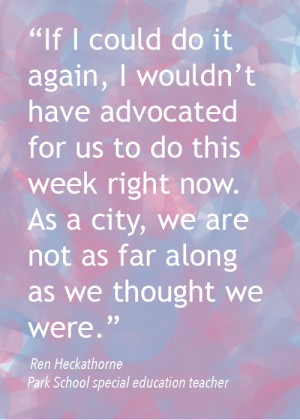
At a board policy meeting during the equity week, some D65 administrators discussed the inconsistency in students receiving the curriculum. Some parents, knowing when the curriculum would be taught, planned to pull their students out of class during that time period, allowing them to essentially opt out.
“I stand by the no opt-out,” said Stacy Beardsley, assistant superintendent for curriculum and instruction at the meeting. “It is not district policy to be creating a space in advance of who can be in school and who can not be part of the learning… All members of the school are part of the learning.”
Kartha said at the meeting that there was no reason for times to be communicated to families to allow them to opt out.
Despite the efforts of the district to be more inclusive by allowing the equity week to occur, Heckathorne said the time could’ve been better spent on making sure the district and the community was ready for those conversations. The district’s hesitance and failure to make the week mandatory was, perhaps, an indication that the community wasn’t yet in a place to engage.
“If I could do it again, I wouldn’t have advocated for us to do this week right now,” Heckathorne said. “As a city, we are not as far along as we thought we were.”
Kartha said the district is committed to working to improve equity standards.
“We will continue to work alongside our administrative team to ensure that our LGBTQ+ population can be fully embraced as their authentic selves in District 65,” Kartha said in a statement.
Looking ahead for sparks of hope
For Heckathorne, the past several years have been nothing short of draining.
“I think I had this thought that I would finally be free and I would finally be who I was,” Heckathorne said. “And yes, I am finally free and I finally am who I am. But I am also more aware of the danger of being who I am than I have ever been before.”
Heckathorne says the harassment at work has changed in that overt harassment and hate toward them has decreased into whispers rather than direct comments. But they attribute the improvement to their pursuit of legal support.
Going forward, Heckathorne said their relationship with their job and work life has never been the same since before their coming out years ago. Safety for themself and their students remains a top concern — they said knowing their coworkers have personal information on their location during the day leads to a “constant” feeling of being unsafe.
While they’re only “very cautiously” optimistic about the prospect of permanent, comprehensive change, Heckathorne said they’ve identified some positives in the community that help them stay motivated. Throughout their experience speaking up about the discrimination, they’ve been supported by several colleagues and allies.
Some of their coworkers have worked extensively to educate themselves — something Heckathorne said they appreciate, as it is not the obligation of a transgender person to completely educate others or to be a “spokesperson” for transgender people.
“For people to say that I was the first trans person they had ever met, to now watch them be incredibly educated and incredibly passionate about trans issues, that’s been amazing to watch,” Heckathorne said.
Although the city lags behind in certain areas relating to LGBTQ+ visibility and rights, Heckathorne still sees smaller signs of hope, such as an increase in gender-inclusive bathrooms in Evanston. These signs can point to a better, more inclusive world that may one day extend further into D65 and into classrooms — creating an environment that can better serve students reckoning with their identity, students who are where Heckathorne once was.
“I see little signs of forward momentum,” Heckathorne said. “I feel assured that what sometimes feels like a giant mess that I made was worth it and for the greater good.”
Email: andreabian2022@u.northwestern.edu
Twitter: @andreabian_

